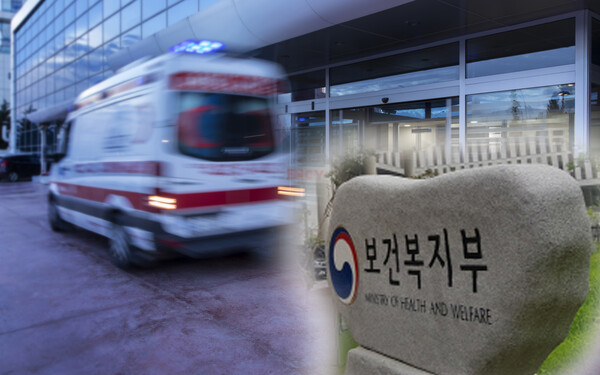
Four medical institutions in Daegu will be subject to administrative measures related to a female teenager’s death in an ambulance after failing to accept the patient on March 19.
The Ministry of Health and Welfare said Thursday it would take administrative steps on four emergency care hospitals among eight medical institutions in the metropolis, based on the investigation into the patient’s death and experts’ meeting according to the Emergency Medical Service Act.
The four are Daegu Fatima Hospital, Kyungpook National University Hospital (KNUH), Keimyung University Dongsan Medical Center, and Daegu Catholic University Medical Center.
The health ministry, Daegu administration, and the National Fire Agency conducted a joint probe from March 29 to April 7. They also held two meetings with 11 experts in emergency care, traumatology, health, and medical policy and laws on April 18 and 26.
Daegu Fatima judged psychiatric care needed; did not triage severity
In Daegu Fatima Hospital, one of the regional emergency care centers the patient first visited, a doctor on duty advised him and a rescuer to move to other hospitals without classifying the patient’s severity, saying the patient “seemed to need mental health treatment through the neuropsychiatric department,” according to officials.
The investigators and experts concluded the hospital violated the emergency care act and its implementing decrees, which call for grading emergency patients’ severity by considering their significant symptoms, vigor, consciousness levels, damage mechanism, and degree of pain.
Later, the rescuer called the hospital again and asked for emergency care other than psychiatric treatment. But the hospital did not accept it because of “difficulty providing psychiatric emergency patients.”
Taking the hospital responsible for violating its duty to classify patient’s severity and rejecting a request to confirm its accommodation capacity without justifiable reasons, the ministry will order the hospital to implement a corrective order under the Emergency Medical Service Act within six months, suspend the emergency medical institution evaluation subsidies during the period, and impose a penalty.
KNUH kept ambulance with the patient in parking lot
In KNUH, also a provincial emergency care center where the patient visited the next time, the rescuer asked to accept the patient at the emergency room after parking the ambulance. But a doctor on duty advised him to check with the regional traumatic center first as the patient is suspected of “severe trauma.”
The investigators and experts concluded that despite the suspected severe trauma, the hospital did not triage severity through seeing the patient face to face, violating the same law.
Afterward, the Daegu Fire Agency called the hospital twice to request the patient’s acceptance. But KNUH did not accept her because of “treating other traumatic patients and lack of beds.” However, according to experts, it turned out later there were beds available, and many other patients were mild cases.
Accordingly, the ministry will instruct the hospital to implement a corrective order within six months, suspend subsidies for the provincial emergency care center and traumatic center, and slap fines.
Two other hospitals get administrative disciplines without penalties
The experts evaluated Keimyung University Dongsan Medical Center, which did not accept two requests for the patient’s acceptance for the reason of “surgery on another traumatic patient,” which also violated the emergency care act by refusing or avoiding providing emergency medical treatment without justifiable reasons.
Accordingly, the ministry decided to instruct it to implement a corrective order until Nov. 3 and suspend subsidies until then.
Daegu Catholic Univ. Medical Center, which failed to accept the patient despite the rescuer’s request on the phone, citing the “lack of neurosurgeons,” was meted with the same discipline as that on Keimyung university hospital.
Four other hospitals did not commit legal violations
They concluded that among four other hospitals, which were also requested to accept the patient, two -- Samil Hospital and Barobone Hospital – did not violate laws, as they let the patient in and examined him but judged they could not provide the treatment needed for the severe traumatic patient and transferred him to other hospitals.
Yeungnam University Medical Center accepted two requests to accept the patient on the phone and did not accept him “for the reason of making him wait for long as the hospital was treating many other severe patients visiting the hospital.” Nazareth General Hospital also did not accept him for the reason of “treating other severe patients.”
The experts concluded it was difficult to regard the two hospitals as having violated the law based on investigative results.
The health ministry also recommended Daegu Metropolitan Government improve the emergency care system, citing the connection and cooperation among various emergency treatment institutions did not work smoothly.
The ministry, for its part, will quickly implement the fourth emergency treatment basic plan (2023-2027) announced on March 21 and push for more supplementary measures.
More specifically, it will strengthen rescue squad guidelines and education, standardize information on emergency patients’ conditions needed when requesting for transfer, manage related records more, specify conditions for difficulty accepting patients, disperse moderate patients to other and less urgent institutions to ease burdens on regional and spherical emergency care centers.
“The government will form a consultative agency with fire agencies, local governments, and related experts to evaluate and circulate improvement plans and check the faithful implementation of the fourth basic plan,” the ministry said.

